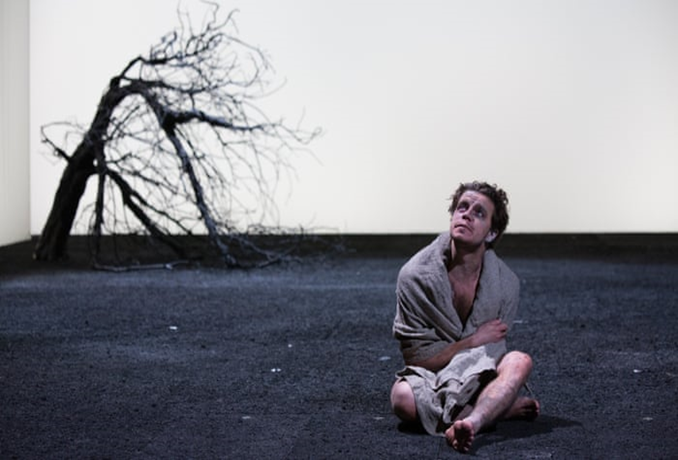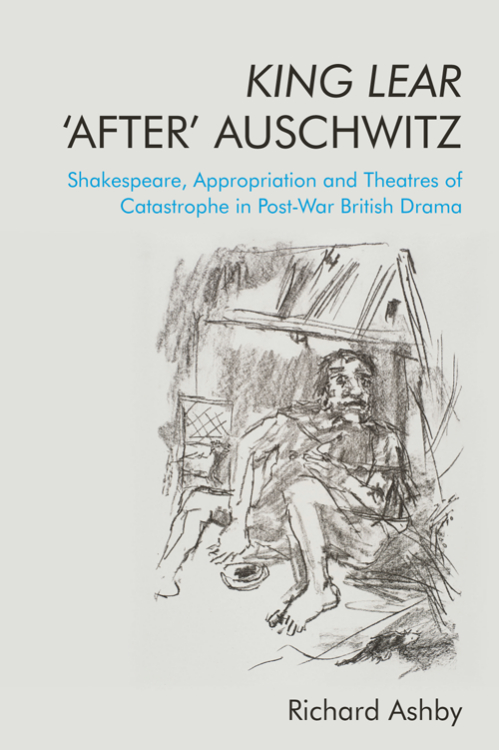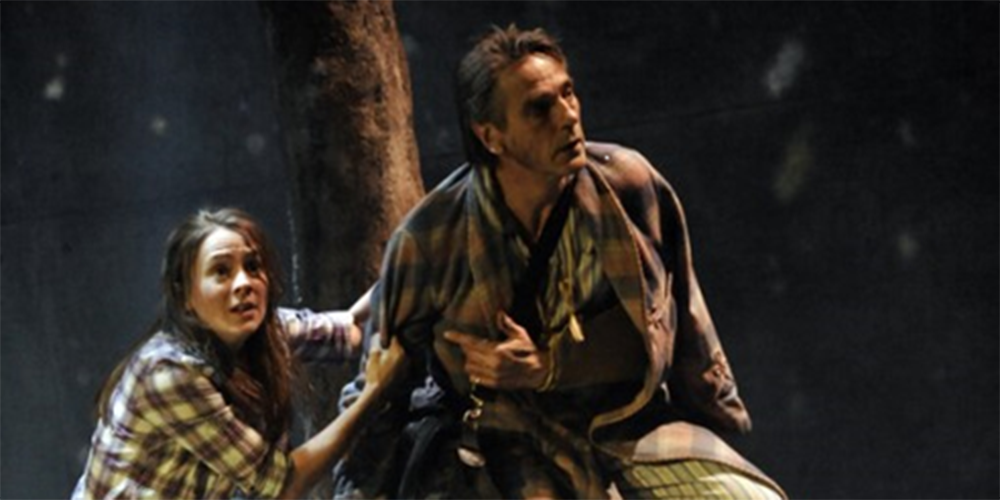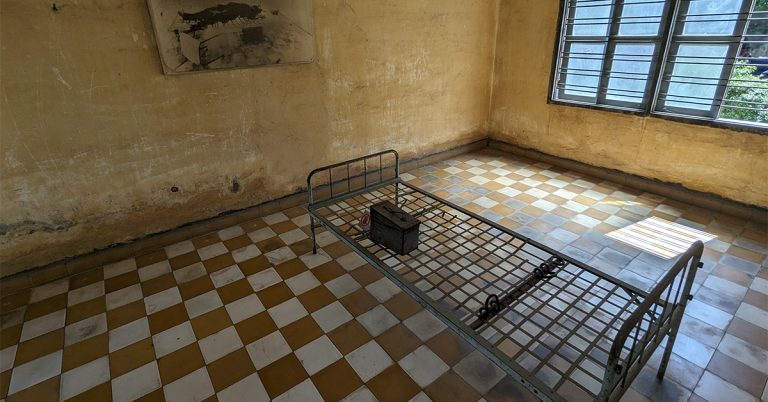
by Dr Richard Ashby
Dr Richard Ashby analyses the 2010 Dennis Kelly play The Gods Weep, showing that playwright Dennis Kelly appropriates King Lear to interrogate the relationship between the Holocaust and climate change.
Near the end of the 2010 Dennis Kelly play The Gods Weep, it suddenly and strangely begins to ‘snow’. Under the fall, the protagonists, Colm and Barbara, come to a disturbing realization:
Suddenly it starts to snow. They look up.
Barbara: What?
They hold their hands out.
Colm: Snow? It’s not cold.
She rubs some in her hand.
Barbara: Ash.
Colm: Ash? Falling out of the sky? Someone must be
burning something. It’s not from near here. What do
you think they’re burning?
They stand for a moment. They suddenly run into the
shelter, away from the ash. They brush it off them,
desperate to get it away from their bodies. They
stare at each other. They watch the ash fall. It is a shocking moment. Colm and Barbara seek cover from the snow because it is really ash – and the ash is coming from burnt, human bodies. The image recalls the industrial incineration of corpses in the Holocaust, the degradation of millions of people into mere ash. The Gods Weep is a play that responds to the catastrophe of Auschwitz and the continuing legacy of the Nazi death camps.
It is also an appropriation of King Lear, its ‘snow’ derived from the stormy, ‘most strange’ and ‘out of season’ weather found in Shakespeare. Kelly sets the action of King Lear in a vast, transnational corporation, which the CEO, Colm, divides among his subordinates. Over the action of the play, the company collapses and, from its ruins, a full-scale war over natural resources emerges. For most of the final act, Colm (the Lear-figure) and Barbara (the Cordelia-figure) are left stranded in a bleak wilderness, while the rival factions continue the conflict. It soon becomes apparent that unimaginable atrocities are taking place, as witnessed by a sky totally inundated with human remains.

King Lear ‘After’ Auschwitz
Kelly was largely condemned for his representation of atrocity and his supposed misuse of Shakespeare, with the theatre critic Charles Spencer finding the play ‘intolerable’. But as I show in my EUP book King Lear ‘After’ Auschwitz: Shakespeare, Appropriation and Theatres of Catastrophe in Post-War British Drama, Kelly is far from the only British playwright to use King Lear to respond to modern catastrophes. Playwrights from Edward Bond to David Rudkin, Howard Barker to Sarah Kane, have also used King Lear to interrogate modern catastrophes and, most of all, the legacy of the Holocaust. With its apocalyptic vision of ‘dark and deadly’ devastation and ‘the disasters of the world’, King Lear has obvious resonances for a post-Holocaust world, and post-war British playwrights have often turned to its language and images.
The Holocaust and Climate Change
What is particularly striking about The Gods Weep is the way Kelly draws a relationship between the Holocaust and climate change. By revealing that the ‘snow’ which falls in the play is really ash from burnt corpses, Kelly relates the mass destruction of human beings to disturbing climatic changes, creating a visual relation between the Holocaust and the present-day climate emergency. Once it had fallen in the original 2010 production at the Hampstead Theatre, the ash remained onstage throughout the rest of the play, so that the earth came to resemble a post-apocalyptic wasteland. The image was strongly reminiscent of the anti-pastoral world of King Lear, where nothing seems to grow and gnawing hunger stalks a ‘blasted’ landscape.

Food Security
It is precisely because of the damage being done to the environment that the corporation Colm presides over in The Gods Weep is investing massively in ‘food security’, which entails buying up fertile land in poor regions of the world in order to lease it to richer nations.
Food security has become a pressing concern as climate change continues to worsen. There are also growing fears that climate change may provoke new outbreaks of mass violence and even genocide, as competing powers and peoples struggle over who controls reserves of space and food – precisely the type of conflict Kelly dramatizes in The Gods Weep. The historian Timothy Snyder, viewing Nazism from the perspective of modern climate change, reminds us that the Holocaust was born out of a pseudo-Darwinian conception of a struggle between races over resources, particularly food. He writes in his Black Earth: The Holocaust as History and Warning that for Hitler in nature ‘conflict was over food, and the weaker races were to starve’. The Holocaust was partly the result of ecological panic, not all that far from contemporary worries about the changing climate. It is for that reason I place ‘after’ in apostrophes in King Lear ‘After’ Auschwitz: the type of genocide seen in the Holocaust cannot be safely consigned to the past, but continues to haunt the present and future.
Conclusion
Throughout the post-war era, playwrights have drawn on King Lear to confront the Holocaust. Writing in a period of climate change, resource conflict and the rise of the far right, Kelly appropriates the play in The Gods Weep to interrogate the relationship between eco-catastrophe and genocide. Though it was met with hostile reviews, The Gods Weep uses King Lear to provide a stark warning about the impact of climate change that is only becoming more relevant – and should surely be listened to.
You can hear more about The Gods Weep and King Lear ‘After’ Auschwitz in my interview with Shakespeare scholar Julia Lupton.

About the Book
Since the events of the Holocaust, playwrights have variously appropriated King Lear to respond to the catastrophes of modern times. With case studies on the works of Edward Bond, David Rudkin, Howard Barker, Sarah Kane, Forced Entertainment and Dennis Kelly, this book explores a range of theatres of catastrophe in post-war British drama and the role that King Lear has played in new forms of post-Holocaust tragedy and tragic freedom.

About the Author
Dr Richard Ashby is a British Academy Postdoctoral Fellow at King’s College London and an Honorary Research Associate at Royal Holloway, University of London. His research concentrates on the afterlives of Shakespeare, especially in post-Holocaust culture. His book, King Lear ‘After’ Auschwitz: Shakespeare, Appropriation and Theatres of Catastrophe in Post-War British Drama, was published by EUP in December 2020. At King’s, he is working on a new project on Shakespeare in Holocaust testimony, literature, and philosophy. His work has also been published in Shakespeare, Textual Practice, Adaptation, Contemporary Theatre Review, and Cahiers Élisabéthains. New articles on Shakespeare and the Holocaust are forthcoming in Shakespeare Bulletin and Comparative Drama. He recently finished a project on theatre director and playwright Harley Granville-Barker while Visiting Research Fellow at Senate House Library, London.






It is interesting as a document of its time, but it all sounds a bit pre-revisionist, given what we now know.